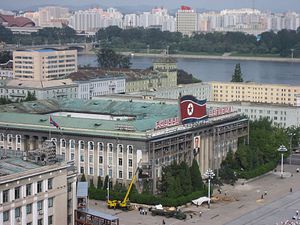When I last reported on Jang Song-Thaek’s purge from the top echelon’s of North Korean leadership, few details had emerged about why precisely Kim Jong-Un had decided to take the steps he did. Jang, the young Kim’s uncle, brother-in-law to his father, was vice chairman of the powerful National Defense Commission (NDC).
Since then, reports emerged that the specific reasons for Jang’s dismissal, as stated by the Kim regime, included factionalism, corruption, substance abuse, anti-state activities (something his closest associates were executed for) and womanizing. The latter point suggests that Jang and his wife, Kim Kyong-Hui (Kim Jong-Il’s sister, a full-blooded Kim by any measure) had grown estranged. Kim Jong-Un’s overture to take action against Jang was probably abetted by this development.
Jang’s purge is a huge deal and the relatively public airing of information around the circumstances of his removal by the regime suggest that Kim Jong-Un wants it known that he no longer requires the sort of “adult supervision” Jang was perceived to provide.
Firstly, Jang’s fall from grace effectively dashes the hopes of many analysts who read him as a Thein Sein or Deng Xiaoping-esque figure, emerging from the ashes of a despondent old guard to bring reform and economic prosperity. Indeed, before Jang Song-Thaek, Kim Jong-Un wasted no time in purging the other candidate for reformism in North Korea: General Ri Yong-Ho. As far as personalities go in North Korea, the one-man, one-dear-leader, one-god model preferred by Kim Il-Sung and Kim Jong-Il will persevere.
With Jang and Ri gone, Kim Jong-Un effectively signals his unwillingness to tolerate any alternate locus of power (as one analyst called it). Curiously, Adam Cathcart, a North Korea-watcher at the University of Leeds, points out that “knowledgeable voices in China are depicting Jang’s views as having been opposed to ‘the Byungjin line,’ which places nuclear development as a necessary precondition for (and, oddly, a stimulant to) economic growth.”
Interestingly, Jang’s proximity to Beijing might have accelerated Kim’s decision to move forward with the purge. Jang was perhaps Beijing’s man in Pyongyang in many ways. Kim Jong-Un has yet to make a trip abroad (despite burgeoning invitations in Beijing). It remains to be seen what the longer term impact of Jang’s dismissal could be on relations across the border with North Korea’s bigger neighbor and only friend (for more on this, see my colleague Shannon’s piece). If Kim Jong-Un takes steps to roll back the trajectory of economic reform such as the special economic zones for certain foreign investors, it would reinforce this line of reasoning.
As is always the case with North Korea, several questions remain unanswered about the conditions surrounding Jang’s purge. What is appreciable at this point, however, is that what was once perceived to have been a relatively smooth process of power transition from one Kim to another was actually fraught with deep-seated factionalism and struggle. It remains to be seen if Kim Jong-Un will continue to prune the North Korean old guard in favor of consolidating his power and his cult of personality.
Note: Since this article was written, reports have confirmed that Jang Song-Thaek has been executed in North Korea. The Diplomat is following the situation.

































